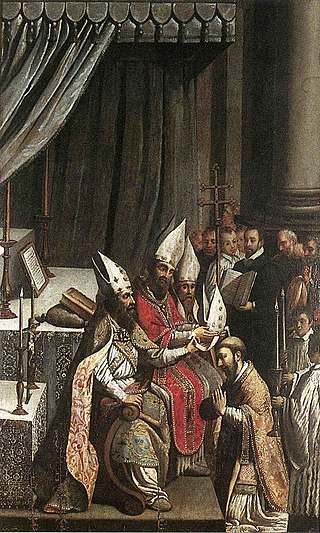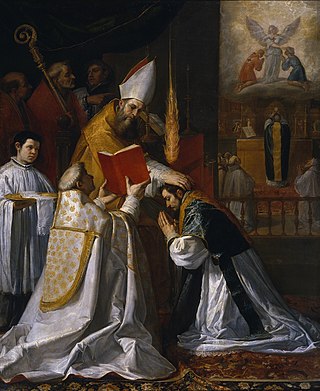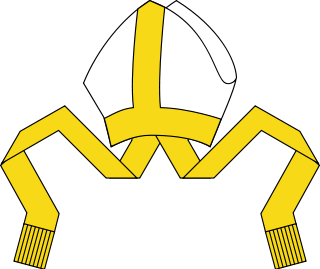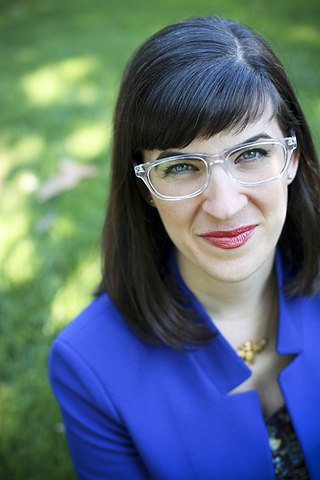Related Research Articles

Apostolic succession is the method whereby the ministry of the Christian Church is considered by some Christian denominations to be derived from the apostles by a continuous succession, which has usually been associated with a claim that the succession is through a series of bishops. Those of the Catholic, Eastern Orthodox, Anglican, Church of Sweden, Oriental Orthodox, Church of the East, Hussite, Moravian and Old Catholic traditions maintain that "a bishop cannot have regular or valid orders unless he has been consecrated in this apostolic succession". These traditions do not always consider the episcopal consecrations of all of the other traditions as valid.

In certain Christian denominations, holy orders are the ordained ministries of bishop, priest (presbyter), and deacon, and the sacrament or rite by which candidates are ordained to those orders. Churches recognizing these orders include the Catholic Church, the Eastern Orthodox, Oriental Orthodox, Anglican, Assyrian, Old Catholic, Independent Catholic and some Lutheran churches. Except for Lutherans and some Anglicans, these churches regard ordination as a sacrament.

Ordination is the process by which individuals are consecrated, that is, set apart and elevated from the laity class to the clergy, who are thus then authorized to perform various religious rites and ceremonies. The process and ceremonies of ordination vary by religion and denomination. One who is in preparation for, or who is undergoing the process of ordination is sometimes called an ordinand. The liturgy used at an ordination is commonly found in a book known as an Ordinal which provides the ordo for celebrations.

The ordination of women to ministerial or priestly office is an increasingly common practice among some contemporary major religious groups. It remains a controversial issue in certain religious groups in which ordination was traditionally reserved for men.

The sacrament of holy orders in the Catholic Church includes three orders: bishops, priests, and deacons, in decreasing order of rank, collectively comprising the clergy. In the phrase "holy orders", the word "holy" means "set apart for a sacred purpose". The word "order" designates an established civil body or corporation with a hierarchy, and ordination means legal incorporation into an order. In context, therefore, a group with a hierarchical structure that is set apart for ministry in the Church.

The priesthood is the office of the ministers of religion, who have been commissioned ("ordained") with the Holy orders of the Catholic Church. Technically, bishops are a priestly order as well; however, in layman's terms priest refers only to presbyters and pastors. The church's doctrine also sometimes refers to all baptised (lay) members as the "common priesthood", which can be confused with the ministerial priesthood of the consecrated clergy.
Clerical celibacy is the discipline within the Catholic Church by which only unmarried men are ordained to the episcopate, to the priesthood in the Latin Church, and similarly to the diaconate. In other autonomous particular churches, the discipline applies only to the episcopate. According to Jason Berry of The New York Times, "The requirement of celibacy is not dogma; it is an ecclesiastical law that was adopted in the Middle Ages because Rome was worried that clerics' children would inherit church property and create dynasties." For several hundred years after the imposition of celibacy on secular (non-monastic/religious) clergy the sale of church offices continued. The first male issue of non-married concubines of celibate clergy became set to continue the dynasty. To curtail this clerical abuse, the Latin Church imposed a ban on the ordination of bastards. This policy ended almost 800 years later in the 20th century.

Thomas Vose Daily was an American prelate of the Roman Catholic Church who served as bishop of the Diocese of Brooklyn in New York from 1990 to 2003. He previously served as bishop of the Diocese of Palm Beach in Florida from 1984 to 1990 and as an auxiliary bishop of the Archdiocese of Boston in Massachusetts from 1975 to 1984
Roman Catholic Womenpriests (RCWP) is an independent international organization that claims a connection to the Roman Catholic Church. It is descended from the Danube Seven, a group of women who assert that they were ordained as priests in 2002 by Rómulo Antonio Braschi, before being excommunicated by the Vatican, and their request for a revocation of the excommunication denied, in Decree on the Attempted Ordination of Some Catholic Women. According to a book published by the organization, Women Find a Way: The Movement and Stories of Roman Catholic Womenpriests, at least two other unnamed bishops were involved in the ordination. In addition, the RCWP considers these bishops to be in good standing, and the RCWP says the bishops acted in full apostolic succession.
Marjorie Tuite, OP was a progressive activist on issues related to the Church and the larger world, such as racism, poverty, war and the ordination of women.
Maureen Fiedler, SL is an American progressive activist, radio host, and a member of the Sisters of Loretto. She has a long history working with interfaith coalitions on a variety of issues including: social justice, peace, anti-racism work, gender equality, human rights and female ordination in the Catholic Church. She holds a doctorate in Government from Georgetown University. She is the executive producer and host of the radio show Interfaith Voices, which she originated.

In the liturgical traditions of the Catholic Church, the term ordination refers to the means by which a person is included in one of the holy orders of bishops, priests or deacons. The teaching of the Catholic Church on ordination, as expressed in the 1983 Code of Canon Law, the Catechism of the Catholic Church, and the apostolic letter Ordinatio sacerdotalis, is that only a Catholic male validly receives ordination, and "that the Church has no authority whatsoever to confer priestly ordination on women and that this judgment is to be definitively held by all the Church's faithful." In other words, the male priesthood is not considered by the church a matter of policy but an unalterable requirement of God. As with priests and bishops, the church ordains only men as deacons.

Women play significant roles in the life of the Catholic Church, although excluded from the Catholic hierarchy of bishops, priests, and deacons. In the history of the Catholic Church, the church often influenced social attitudes toward women. Influential Catholic women have included theologians, abbesses, monarchs, missionaries, mystics, martyrs, scientists, nurses, hospital administrators, educationalists, religious sisters, Doctors of the Church, and canonised saints. Women constitute the majority of members of consecrated life in the Catholic Church: in 2010, there were around 721,935 professed women religious. Motherhood and family are given an exalted status in Catholicism, with The Blessed Virgin Mary holding a special place of veneration.

"A Catholic Statement on Pluralism and Abortion", alternatively referred to by its pull quote "A Diversity of Opinions Regarding Abortion Exists Among Committed Catholics" or simply "The New York Times ad", was a full-page advertisement placed on October 7, 1984, in The New York Times by Catholics for a Free Choice (CFFC). Its publication brought to a head the conflict between the Vatican and those American Catholics who were pro-choice. The publicity and controversy which followed its publication helped to make the CFFC an important element of the pro-choice movement.
Jane Dewar Schaberg was an American biblical scholar who served as Professor of Religious Studies and of Women's Studies at the University of Detroit Mercy from 1977 through 2009.
Donna Quinn was a Catholic nun and a lifelong feminist activist who was known for her involvement with the National Coalition of American Nuns and association with Women-Church Convergence (W-CC).

Kathleen Marie Kelly is an American activist, human rights lawyer, and Mormon feminist who founded Ordain Women, an organization advocating for the ordination of women to the priesthood in the Church of Jesus Christ of Latter-day Saints. Kelly was excommunicated from the church in 2014. She is also a nationally known advocate for ratification of the Equal Rights Amendment (ERA) and abortion access.
This is a timeline of women in religion. See also: Timeline of women in religion in the United States.
This is a timeline of notable moments in the history of women's ordination in the world's religious traditions. It is not an exhaustive list of all historic or contemporary ordinations of women.
References
- ↑ "About Us". romancatholicwomenpriests. Retrieved 27 November 2019.
- ↑ NY Times: A Place at the Altar
- ↑ "National Catholic Reporter: Sixth Catholic woman priest ordained this year". Archived from the original on 2008-08-27. Retrieved 2019-08-06.
- ↑ "Meet the Ordained". Roman Catholic Women Priests. Retrieved 27 November 2019.
- ↑ Zimmerman, Eilene. "Jane Via-Profile". San Diego magazine. Retrieved 27 November 2019.
- ↑ "Meet the Ordained". romancatholicwomenpriests. Retrieved 27 November 2019.
- ↑ Keller, Rosemary Skinner; Ruether, Rosemary Radford; Cantlon, Marie (2006). Encyclopedia of women and religion in North America. Vol. 3. Indiana University Press. pp. 1104–1106. ISBN 0-253-34688-6.
- ↑ Fields, Robin (2006-08-14). "Female priest defies the Catholic Church". Los Angeles Times. p. B-4. Retrieved 2008-10-12.
- ↑ "National Catholic Reporter". Archived from the original on 2012-07-13. Retrieved 2019-08-06.
- ↑ "Disinvited". Archived from the original on 2007-08-30. Retrieved 2007-11-18.
- ↑ Elizabeth Jane Via record with California Bar Association